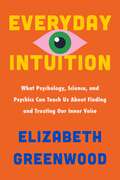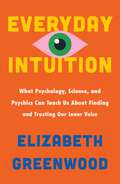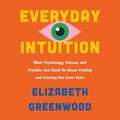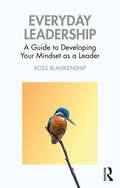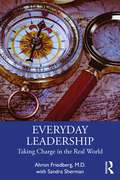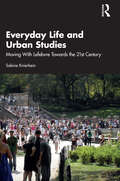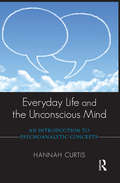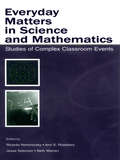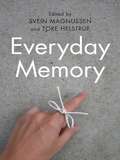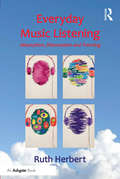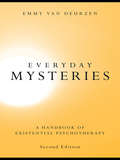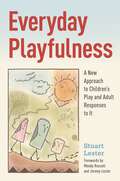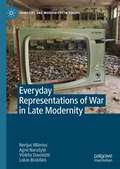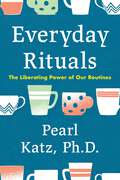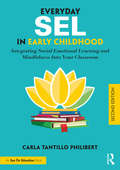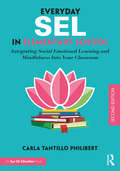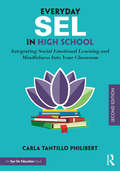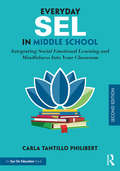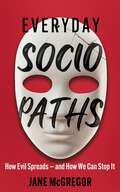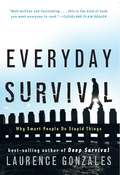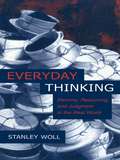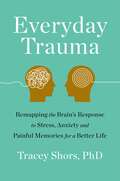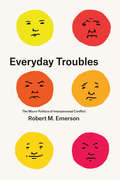- Table View
- List View
Everyday Intuition: What Psychology, Science, and Psychics Can Teach Us About Finding and Trusting Our Inner Voice
by Elizabeth GreenwoodA captivating and insightful deep dive into the world of human intuition, exploring the power of this elusive phenomenon and how it can be harnessed to better know and trust ourselves. We rely on our intuition, even though we don’t fully understand what it is, how it works, or if we can even trust it. In this fresh, mind-opening book, Elizabeth Greenwood takes us on a sweeping investigation into the subject, exploring how, in our data-driven world, we can harness intuition in our day-to-day lives.Digging deep into her personal experience as well as insights from neuroscience, psychology, , feminist texts, psychics, and everyday people with extraordinary intuitive ability, Greenwood explores what we know about intuition—how to distinguish it from instinct, wishful thinking, anxiety, and denial; how it serves and sometimes fails us; how it impacts our dreams and unconscious behavior; and how it manifests in everything from romantic attraction to premonitions. Greenwood places a special emphasis on “women’s intuition,” and how it has been denigrated throughout history—but can offer us a more hopeful, grounded way of experiencing the world in a time of so much uncertainty.Everyday Intuition provides practical advice on tapping into our self-knowledge and learning to trust our instincts. It examines the science behind intuition, including how our brains process information, how psychedelic medicine and manifestation are opening new doors of consciousness—as well as how these helpful methods are being abused by charlatans, including some "coaches," "teachers," and social media influencers offering false promises—and how we can train ourselves to be more intuitive and ultimately enhance our daily lives.Smart, funny, sincere, and profound, this helpful guide is a modern take on one of the oldest tools we possess. It shows us how embracing intuition can lead us to our truest, most mindful selves, and to better align the lives we are living with the lives we desire.
Everyday Intuition: What Psychology, Science, and Psychics Can Teach Us About Finding and Trusting Our Inner Voice
by Elizabeth Greenwood'EVERYDAY INTUITION changed my life. This is not an exaggeration! After a lifetime of gaslighting myself into an anxious mess, this book gave me the permission to trust my instincts. Liz Greenwood goes further and deeper than most reporters, and the result is Janet Malcolm meets Mel Robbins, but millennial.' Jean Hannah EdelsteinA captivating and insightful deep dive into the world of human intuition, exploring the power of this elusive phenomenon and how it can be harnessed to better know and trust ourselves.We rely on our intuition, even though we don't fully understand what it is, how it works, or if we can even trust it. In this fresh, mind-opening book, Elizabeth Greenwood takes us on a sweeping investigation into the subject, exploring how, in our data-driven world, we can harness intuition in our day-to-day lives.Digging deep into her personal experience as well as insights from neuroscience, psychology, , feminist texts, psychics, and everyday people with extraordinary intuitive ability, Greenwood explores what we know about intuition-how to distinguish it from instinct, wishful thinking, anxiety, and denial; how it serves and sometimes fails us; how it impacts our dreams and unconscious behavior; and how it manifests in everything from romantic attraction to premonitions. Greenwood places a special emphasis on "women's intuition," and how it has been denigrated throughout history-but can offer us a more hopeful, grounded way of experiencing the world in a time of so much uncertainty.Everyday Intuition provides practical advice on tapping into our self-knowledge and learning to trust our instincts. It examines the science behind intuition, including how our brains process information, how psychedelic medicine and manifestation are opening new doors of consciousness-as well as how these helpful methods are being abused by charlatans, including some "coaches," "teachers," and social media influencers offering false promises-and how we can train ourselves to be more intuitive and ultimately enhance our daily lives.Smart, funny, sincere, and profound, this helpful guide is a modern take on one of the oldest tools we possess. It shows us how embracing intuition can lead us to our truest, most mindful selves, and to better align the lives we are living with the lives we desire.
Everyday Intuition: What Psychology, Science, and Psychics Can Teach Us About Finding and Trusting Our Inner Voice
by Elizabeth Greenwood'EVERYDAY INTUITION changed my life. This is not an exaggeration! After a lifetime of gaslighting myself into an anxious mess, this book gave me the permission to trust my instincts. Liz Greenwood goes further and deeper than most reporters, and the result is Janet Malcolm meets Mel Robbins, but millennial.' Jean Hannah EdelsteinA captivating and insightful deep dive into the world of human intuition, exploring the power of this elusive phenomenon and how it can be harnessed to better know and trust ourselves.We rely on our intuition, even though we don't fully understand what it is, how it works, or if we can even trust it. In this fresh, mind-opening book, Elizabeth Greenwood takes us on a sweeping investigation into the subject, exploring how, in our data-driven world, we can harness intuition in our day-to-day lives.Digging deep into her personal experience as well as insights from neuroscience, psychology, , feminist texts, psychics, and everyday people with extraordinary intuitive ability, Greenwood explores what we know about intuition-how to distinguish it from instinct, wishful thinking, anxiety, and denial; how it serves and sometimes fails us; how it impacts our dreams and unconscious behavior; and how it manifests in everything from romantic attraction to premonitions. Greenwood places a special emphasis on "women's intuition," and how it has been denigrated throughout history-but can offer us a more hopeful, grounded way of experiencing the world in a time of so much uncertainty.Everyday Intuition provides practical advice on tapping into our self-knowledge and learning to trust our instincts. It examines the science behind intuition, including how our brains process information, how psychedelic medicine and manifestation are opening new doors of consciousness-as well as how these helpful methods are being abused by charlatans, including some "coaches," "teachers," and social media influencers offering false promises-and how we can train ourselves to be more intuitive and ultimately enhance our daily lives.Smart, funny, sincere, and profound, this helpful guide is a modern take on one of the oldest tools we possess. It shows us how embracing intuition can lead us to our truest, most mindful selves, and to better align the lives we are living with the lives we desire.
Everyday Leadership: A Guide to Developing Your Mindset as a Leader
by Ross BlankenshipThis engaging book presents useful frameworks, key ideas, and practical techniques – all grounded in scientific research – to help you lead better on a day-to-day basis.Whether you are moving into your first leadership role or are already a leader and looking to expand your purview and skillset, this is an essential resource for understanding leadership. Recognizing that a one-size-fits-all leadership approach isn’t always possible, Everyday Leadership encourages you to develop your own leader mindset. It gives a foundational overview of what leadership is, what makes leaders effective, and how to think systematically about organizations and teams. Translating science into accessible and practical language, it also offers general guidance for those who are interested in expanding their skills and knowledge. These teachings are supported by easy-to-follow reflective questions and exercises, allowing you to put these ideas into practice and develop a leadership practice that works best for you. At a time when people need to be empowered to lead, it will encourage you to truly think about what it means to lead other people in work and in life.Providing a toolkit that covers basic theories, concepts, and practices in leadership research, this book is a go-to resource for all leaders wherever you are in your leadership journey.
Everyday Leadership: Taking Charge in the Real World
by Sandra Sherman Ahron Friedberg, M.D.Everyday Leadership examines how individuals in everyday, relatively small settings can succeed in leadership positions.The book provides tools for tackling the unique psychological and external challenges that everyday leaders face, and offers principles that they can adapt to their own situations. Dr. Ahron Friedberg, who regularly advises leaders and would-be leaders, emphasizes the social aspect of leadership, and explores how those who are new to leadership – and those in established positions – can leverage their support networks and thrive in their roles. The book follows the experience of real people who have faced leadership challenges and learned from them, demonstrating how readers can learn from these examples and apply them to their own circumstances. Guided by a practical leadership roadmap, chapters examine concepts such as vision, determination, flexibility, planning, organization, and responsibility using extensive case studies, with reflective questions and key takeaways that help the reader consider how to apply these principles to their own leadership challenges.This book is an essential read for HR professionals, executive coaches, management consultants, leadership trainers, and organizational psychologists as well as those facing leadership challenges in their profession.
Everyday Life and Urban Studies: Moving With Lefebvre Towards the 21st Century
by Sabine KnierbeinEveryday Life and Urban Studies revisits the ordinary routines that shape urban life during the crises-ridden last century and early new millennium. Vast parts of Henri Lefebvre’s intellectual work on everyday life however remain underappreciated in urban studies. This book seeks to re-integrate Lefebvre’s Critique of Everyday Life into studies of urbanization. Starting in the 1920s, the book realigns historical insights with contemporary urban phenomena to uncover patterns of capitalist urbanization. By showing the relevance of grasping the minutiae of everyday life to understanding cities, the urban and urbanization today; everyday life, space, and philosophy are brought back in tension. This work combines analytical-methodological exploration, pedagogic mission, and theoretical advances to carve out an everyday-theory-based approach to urban studies situated at the interface of the spatial arts, the humanities, and the social sciences. This book examines the transformative potential that lies hidden in everyday life thereby unravelling a way to nurture hope amid unsettled urban conditions.The book is essential for students, faculty, and researchers in the fields of urban studies, city planning, urban design, human geography, sociology, cultural studies, and political science.
Everyday Life and the Unconscious Mind: An Introduction to Psychoanalytic Concepts
by Hannah CurtisAn increasing number of people are seeking to develop an understanding of psychoanalytic concepts in order to apply them to the ordinary situations that they encounter as they go about their work, family and social lives. Some of these people are students just leaving college and going on to university, some are managers seeking to understand the dynamics of work place relationships and some are the friends or families of people who suffer with emotional distress or mental health issues. Everyday Life and the Unconscious Mind is written for students, for those who work in the care sector, or in management, and for those who love someone who is struggling emotionally. It explains and clarifies some of the concepts that address the way in which the unconscious mind works and how it seeks to manage its feelings. It includes chapters on trauma and defence mechanisms, which are to do with how we cope with events that act like a psychological blow to our self esteem or our identity.
Everyday Matters in Science and Mathematics: Studies of Complex Classroom Events
by Beth Warren Ricardo Nemirovsky Ann S. Rosebery Jesse SolomonThis book re-examines the dichotomy between the everyday and the disciplinary in mathematics and science education, and explores alternatives to this opposition from points of view grounded in the close examination of complex classroom events. It makes the case that students' everyday experience and knowledge in their entire manifold forms matter crucially in learning sciences and mathematics. The contributions of 13 research teams are organized around three themes: 1) the experiences of students in encounters with everyday matters of a discipline; 2) the concerns of curriculum designers, including teachers, as they design activities intended to focus on everyday matters of a discipline; and 3) the actions of teachers as they create classroom encounters with everyday matters of a discipline.As a whole the volume reflects the shift in the field of educational research in recent years away from formal, structural models of learning toward emphasizing its situated nature and the sociocultural bases of teaching and learning. At least two trends--increasing awareness that formal theories can be useful guides but are always partial and provisional in how they disclose classroom experiences, and the widespread availability of video and audio equipment that enables effortless recording of classroom interactions--have reoriented the field by allowing researchers and teachers to look at learning starting with complex classroom events rather than formal theories of learning. Such examinations are not meant to replace the work on general theoretical frameworks, but to ground them in actual complex events. This reorientation means that researchers and teachers can now encounter the complexity of learning and teaching as lived, human meaning-making experiences. Immersion in this complexity compels rethinking assumptions about the dichotomies that have traditionally organized the field's thinking about learning. Further, it has important implications for how the relationship between theory and practice in understanding teaching and learning is viewed.Everyday Matters in Science and Mathematics: Studies of Complex Classroom Events is an important resource for researchers, teacher educators, and graduate students in mathematics and science education, and a strong supplemental text for courses in these areas and also in cognition and instruction and instructional design.
Everyday Memory
by Svein Magnussen Tore HelstrupThis book presents an authoritative overview of memory in everyday contexts. Written by an expert team of international authors, it gathers together research on some of the more neglected but revealing areas of memory, to provide a comprehensive overview of remembering in real life situations. Contributions from leading experts deal with a variety of important questions concerning everyday memory, from under-researched areas such as memory for odours, to more well known areas, like collective memory. Topics covered also include: Beliefs about memory and the metaphors used to discuss memory The relation between self-referent beliefs and actual memory performance The development of autobiographical memory. Everyday Memory summarises current knowledge and presents new interpretations and hypotheses to be explored by future research. It discusses aspects of human memory which are frequently ignored or dealt with only very briefly by ordinary textbooks and as a result will have a broad appeal for researchers and students.
Everyday Music Listening: Absorption, Dissociation and Trancing
by Ruth HerbertIn what ways does listening to music shape everyday perception? Is music particularly effective in promoting shifts in consciousness? Is there any difference perceptually between contemplating one's surroundings and experiencing a work of art? Everyday Music Listening is the first book to focus in depth on the detailed nature of music listening episodes as lived mental experiences. Ruth Herbert uses new empirical data to explore the psychological processes involved in everyday music listening scenarios, charting interactions between music, perceiver and environment in a diverse range of real-world contexts. Findings are integrated with insights from a broad range of literature, including consciousness studies and research into altered states of consciousness, as well as ideas from ethology and evolutionary psychology, suggesting that a psychobiological capacity for trancing is linked to the origins of making and receiving of art. The term 'trance' is not generally associated with music listening outside ethnomusicological studies of strong experiences, yet 'hypnotic-like' involvements in daily life have long been recognized by hypnotherapy researchers. The author argues that multiply distributed attention - prevalent in much contemporary listening- does not necessarily indicate superficial engagement. Music emerges as a particularly effective mediator of experience. Absorption and dissociation, as manifestations of trancing, are self-regulatory processes, often operating at the level of unconscious awareness, that support individuals' perceptions of psychological health. This fascinating study brings together research and theory from a wide range of fields to provide a new framework for understanding the phenomenology of music listening in a way that will appeal to both specialist academic audiences and a broad general readership.
Everyday Mysteries: A Handbook of Existential Psychotherapy
by Emmy van DeurzenThis book provides an in-depth introduction to existential psychotherapy. Presenting a philosophical alternative to other forms of psychological treatment, it emphasises the problems of living and the human dilemmas that are often neglected by practitioners who focus on personal psychopathology. Emmy van Deurzen defines the philosophical ideas that underpin existential psychotherapy, summarising the contributions made by Kierkegaard, Nietzsche, Heidegger and Sartre among others. She proposes a systemic and practical method of existential psychotherapy, illustrated with detailed case material. This expanded and updated second edition includes new chapters on the contributions of Max Scheler, Albert Camus, Gabriel Marcel and Emmanuel Levinas, as well as on feminist contributors such as Simone de Beauvoir and Hannah Arendt. In addition a new extended case discussion illustrates the approach in practice. Everyday Mysteries offers a fresh perspective for anyone training in psychotherapy, counselling, psychology or psychiatry. Those already established in practice will find this a stimulating source of ideas about everyday life and the mysteries of human experience, which will throw new light on old issues.
Everyday Playfulness: A New Approach to Children’s Play and Adult Responses to It
by Stuart LesterSeeing play as an important and vital element of life for children and adults alike, this book addresses the ways in which practitioners take account of and act responsibly with moments of children's play and playfulness.Working with the Playwork Principles, the book draws on alternative concepts to traditional approaches, including ideas from materialist and posthuman philosophy and human geography, to explore playing as process rather than product. Topics covered include play and wellbeing, play and space, and the micro-politics of playing, critical cartography and adult account-ability and response-ability. It concludes by considering the implications for professional practice and offering ways that professionals can develop practices that maintain and co-create favourable conditions in which children's play can flourish.
Everyday Representations of War in Late Modernity (Identities and Modernities in Europe)
by Violeta Davoliūtė Nerijus Milerius Agnė Narušytė Lukas BrašiškisThis book analyses photographic and cinematographic representations of war and its memorialisation rituals in the period of late modernity from the perspectives of cultural sociology, philosophy, art theory and film studies. It reveals how the experience of war trauma takes root in everydayness and shows how artists try to question the ‘normality’ of the everyday, to actualise the memory of war trauma, to rethink the contrasting experiences of the time of war and everydayness, and to oppose the imposed historical narratives. The new representations are analysed by developing theories of war as a ‘magic spectacle’, also by using such concepts as spectres, triumph and trauma, collective social catastrophes, forensic architecture and others.
Everyday Rituals: The Liberating Power of Our Routines
by Pearl Katz Ph.DWhen we are in painfully difficult or confusing life situations, especially amidst ever-uncertain times, our minds grapple for structure: a funeral ceremony definitively lays the dead to rest; the exaggerated choreography of a surgical room confirms its sterility; and a daily schedule gives prisoners a sense of normalcy. These practices, these rituals, give us peace. Though it might seem contradictory, ordered rituals actually bring us freedom, creativity, and mental well-being. Rituals aren&’t a thing of history or belonging to elaborate ceremonies, and they aren&’t even confined to the most painful or confusing of times. Rituals can be at a family dinner table or in a morning bathroom routine. In Everyday Rituals, Pearl Katz shows us just how transformative rituals are, no matter what kind.Unlike other titles on the subject in the self-help genre or in anthropological reportage, Katz applies her years of fieldwork and psychiatric study to tangible, everyday American life. She writes a thoroughly persuasive argument, using poignant case studies, to truly inspire readers. Specific hormones flow and brain paths open when artists follow their creative regimen, and mental health increases in patients under hospital directive; in contrast, young people suffer stress in unbounded undergraduate hookup culture. And after the coronavirus ripped many rituals from American life, the ill effects of a life without routine burn bright. It&’s in the ordinary that Katz discovers unlimited potential: mundane routine actually sparks incredible imagination. With scientific evidence, case studies, personal narrative, and guiding wisdom, Katz enlightens us as to how and why we can feel true freedom.
Everyday SEL in Early Childhood: Integrating Social Emotional Learning and Mindfulness Into Your Classroom
by Carla Tantillo PhilibertWith this bestselling book from educational consultant Carla Tantillo Philibert, you’ll gain practical strategies for teaching Social Emotional Learning (SEL), mindfulness, and well-being to help improve the human connection between you and your students. You’ll find out how to lead students through mindfulness activities, simple yoga poses, and breath-work techniques. Topics include mindful practices, well-being strategies to combat stress and anxiety, giving your students the space to understand their emotions and strengthen peer-to-peer communication, developing the foremost and essential SEL competencies, and engaging in experiential activities to strengthen SEL skills. The new edition reflects the latest CASEL guidelines and includes updated activities, as well as a brand-new directory of terms, and an intentional focus on educators’ and students’ socio-emotional well-being. Perfect for early childhood educators at any level of experience, the book will help you develop positive youth identity and promote connectedness so students can deal successfully with life’s stressors beyond school doors.
Everyday SEL in Elementary School: Integrating Social Emotional Learning and Mindfulness Into Your Classroom
by Carla Tantillo PhilibertWith this bestselling book from educational consultant Carla Tantillo Philibert, you’ll gain practical strategies for teaching Social Emotional Learning (SEL), mindfulness, and well-being to help improve the human connection between you and your students. You’ll find out how to lead students through mindfulness activities, simple yoga poses, and breath-work techniques. Topics include mindful practices, well-being strategies to combat stress and anxiety, giving your students the space to understand their emotions and strengthen peer-to-peer communication, developing the foremost and essential SEL competencies, and engaging in experiential activities to strengthen SEL skills. The new edition reflects the latest CASEL guidelines and includes updated activities, as well as a brand-new directory of terms, and an intentional focus on educators’ and students’ socio-emotional well-being. Perfect for elementary school educators at any level of experience, the book will help you develop positive youth identity and promote connectedness so students can deal successfully with life’s stressors beyond school doors.
Everyday SEL in High School: Integrating Social Emotional Learning and Mindfulness Into Your Classroom
by Carla Tantillo PhilibertWith this bestselling book from educational consultant Carla Tantillo Philibert, you’ll gain practical strategies for teaching Social Emotional Learning (SEL), mindfulness, and well-being to help improve the human connection between you and your students. You’ll find out how to lead students through mindfulness activities, simple yoga poses, and breath-work techniques. Topics include mindful practices, well-being strategies to combat stress and anxiety, giving your students the space to understand their emotions and strengthen peer-to-peer communication, developing the foremost and essential SEL competencies, and engaging in experiential activities to strengthen SEL skills. The new edition reflects the latest CASEL guidelines and includes updated activities, as well as a brand-new directory of terms, and an intentional focus on educators’ and students’ socio-emotional well-being. Perfect for high school educators at any level of experience, the book will help you develop positive youth identity and promote connectedness so students can deal successfully with life’s stressors beyond school doors.
Everyday SEL in Middle School: Integrating Social Emotional Learning and Mindfulness Into Your Classroom
by Carla Tantillo PhilibertWith this bestselling book from educational consultant Carla Tantillo Philibert, you’ll gain practical strategies for teaching Social Emotional Learning (SEL), mindfulness, and well-being to help improve the human connection between you and your students. You’ll find out how to lead students through mindfulness activities, simple yoga poses, and breath-work techniques. Topics include mindful practices, well-being strategies to combat stress and anxiety, giving your students the space to understand their emotions and strengthen peer-to-peer communication, developing the foremost and essential SEL competencies, and engaging in experiential activities to strengthen SEL skills. The new edition reflects the latest CASEL guidelines and includes updated activities, as well as a brand-new directory of terms, and an intentional focus on educators’ and students’ socio-emotional well-being. Perfect for middle school educators at any level of experience, the book will help you develop positive youth identity and promote connectedness so students can deal successfully with life’s stressors beyond school doors.
Everyday Sociopaths: How Evil Spreads and How We Can Stop It
by Jane McGregor'Offers answers, healing and game-changing new insights' Jackson MacKenzieIf you're in a relationship where you're always in the wrong, and constantly being criticised, the chances are you're with a sociopath - someone without a conscience, whose personality shows extreme antisocial tendencies.Now substantially updated with shocking new statistics and compelling case studies, this book is designed to help you identify the sociopath destroying your happiness, and it gives you the tools you need to protect yourself against these arch-manipulators. It will help you to see their behaviour for what it really is, understand the way they interact with others, and extract yourself from a destructive relationship - whatever its nature. You will regain control of your life for good, and become a survivor; a stronger person.More than just a practical guide, Everyday Sociopaths sends out a call to all of us, not only to identify and call out the sociopaths in our midst, but also to contribute to a culture where empathy exists as a prized virtue with the potential to transform society at every level.
Everyday Sociopaths: How Evil Spreads and How We Can Stop It
by Jane McGregor'Offers answers, healing and game-changing new insights' Jackson MacKenzieIf you're in a relationship where you're always in the wrong, and constantly being criticised, the chances are you're with a sociopath - someone without a conscience, whose personality shows extreme antisocial tendencies.Now substantially updated with shocking new statistics and compelling case studies, this book is designed to help you identify the sociopath destroying your happiness, and it gives you the tools you need to protect yourself against these arch-manipulators. It will help you to see their behaviour for what it really is, understand the way they interact with others, and extract yourself from a destructive relationship - whatever its nature. You will regain control of your life for good, and become a survivor; a stronger person.More than just a practical guide, Everyday Sociopaths sends out a call to all of us, not only to identify and call out the sociopaths in our midst, but also to contribute to a culture where empathy exists as a prized virtue with the potential to transform society at every level.
Everyday Survival: Why Smart People Do Stupid Things
by Laurence Gonzales"Well-written and fascinating . . . this is the kind of book you want everyone to read."--Cleveland Plain Dealer "Curiosity, awareness, attention," Laurence Gonzales writes. "Those are the tools of our everyday survival. . . . We all must be scientists at heart or be victims of forces that we don't understand." In this fascinating account, Gonzales turns his talent for gripping narrative, knowledge of the way our minds and bodies work, and bottomless curiosity about the world to the topic of how we can best use the blessings of evolution to overcome the hazards of everyday life. Everyday Survival will teach you to make the right choices for our complex, dangerous, and quickly changing world--whether you are climbing a mountain or the corporate ladder.
Everyday Thinking: Memory, Reasoning, and Judgment in the Real World
by Stanley WollAppropriate as a textbook for courses in cognitive psychology or social cognition, Everyday Thinking reviews the rapidly growing literature on cognition in naturalistic settings. It differs from other textbooks in that, where possible, it focuses on thinking in real-world settings rather than in controlled laboratory settings and provides detailed treatments of each of the following topics: * how we form impressions of and represent persons in memory; * how we recognize and represent faces; * how we reason in our day-to-day lives and go about solving everyday problems; * how we make judgments and decisions; * how we encode memories of events--both for future action and for our own life histories; and * what are some of the implications of everyday knowledge and cognition for education and instruction. This book presents the theoretical positions and research evidence on each of these topics and examines the generally unexplored connections among them. As a result, this book presents the study of cognition in a more relevant form and in a context that readers can more readily apply to their own lives.
Everyday Trauma: Remapping the Brain's Response to Stress, Anxiety, and Painful Memories for a Better Life
by Tracey ShorsA neuroscientist explores how trauma impacts the brain, especially for women—and how we can learn to heal ourselvesEveryone experiences trauma. Whether a specific harrowing event or a series of stressful moments that culminate over time, trauma can echo and etch itself into our brain as we remember it again and again throughout our lives.In Everyday Trauma, neuroscientist Dr. Tracey Shors examines trauma with a focus on its pervasive nature—how it can happen at any time, through big or small events, and how it often reappears in the form of encoded memory. Her research reveals that when we are reminded of our trauma, reliving that tragic moment copies yet another memory of it in our brain, making it that much more difficult to forget. Dr. Shors also explores the neuroscience behind why women in particular are more vulnerable to stress and traumatic events, setting them up to be three times more likely than men to suffer PTSD.With potential long-term consequences such as addiction, anxiety, depression, and PTSD, trauma can have a lasting impact on both the brain and body. Dr. Shors illuminates the effective tools that can reduce the repetitive thoughts that reinforce our traumas, including cognitive-based therapies and trauma-informed care such as her own groundbreaking program, a combination of mental and physical training called MAP Training.By understanding how our brain responds to trauma and practicing proven techniques that can train our brains and help us let go of our tragic memories—whatever they may be—we are better equipped to leave our traumatic pasts behind and live in a brighter present.
Everyday Troubles: The Micro-Politics of Interpersonal Conflict
by Robert M. EmersonFrom roommate disputes to family arguments, trouble is inevitable in interpersonal relationships. In Everyday Troubles, Robert M. Emerson explores the beginnings and development of the conflicts that occur in our relationships with the people we regularly encounter—family members, intimate partners, coworkers, and others—and the common responses to such troubles. To examine these issues, Emerson draws on interviews with college roommates, diaries documenting a wide range of irritation with others, conversations with people caring for family members suffering from Alzheimer’s, studies of family interactions, neighborly disputes, and other personal accounts. He considers how people respond to everyday troubles: in non-confrontational fashion, by making low-visibility, often secretive, changes in the relationship; more openly by directly complaining to the other person; or by involving a third party, such as friends or family. He then examines how some relational troubles escalate toward extreme and even violent responses, in some cases leading to the involvement of outside authorities like the police or mental health specialists. By calling attention to the range of possible reactions to conflicts in interpersonal relationships, Emerson also reminds us that extreme, even criminal actions often result when people fail to find ways to deal with trouble in moderate, non-confrontational ways. Innovative and insightful, Everyday Troubles is an illuminating look at how we deal with discord in our relationships.

